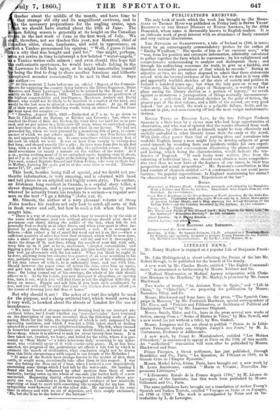PUBLICATIONS RECEIVED.
The only book of -mark which the week has brought us (for MEMO- Rum or THOMAS HOOD was published on Friday last) is SEVEN YRAns' RESIDENCE IN THE GREAT DESERTS OF NORTH .AAFERICA, by the Abbd Doraenich, whose name is favourably known to English readers. It is an elaborate work of great interest with an abundance of finely executed and very curious illustrationa.
Trrn NEVILLES or GARRETSTOWN, a tale of Ireland in 1760, is-intro- duced by an extravagantly _commendatory preface by the author of "Emilia Wyndham.' She speaks of him as an eminent man," who "was, from his position and extensive information, admirably calculated to gather together the facts which he represents ; by his enlightened and comprehensive understanding to analyze and distinguish them ; and through his unflinching reverence for truth, to give us a faithful, and therefore invaluable portraiture of that which he records." Bating an adjective or two, we are rather disposed to admit that these statements accord with the internal evidence of the book, for we find in it very able and apparently truthful sketches of the state of society and politics in Ireland a hundred years ago' but when the lady goes on to say that "this story, like the historical plays of Shakspeare, is worthy to find a place among the library shelves as a portion of history," we revolt against so monstrous a Juxtaposition of things mutually incommensur- able. As a collection of historical sketches in the guise of fiction, the greater part of the first volume, and a little of the second, are very good indeed ; but as a novel, the work is a palpable failure, feeble and in- coherent in plot, and soon running off into the most vulgar melodramatic devices.
ROUGH TYPES OF ENGLISH LIFE, by the late Jelinger Cookson Symons is a little hook by a clever man who had large opportunities of observation, and who was of opinion that the results obtained from such opportunities, by others as well as himself, might be very effectively and usefully embodied in other literary forms than the essay or the novel. With little other power than that of putting ideas and narrations into readable English, many a man might help to develop subjects of great social interest, by recording facts and incidents within his own experi- ence, and thoughts and conversations illustrating the phases of opinion and feeling, which being the characteristics, would indicate the ten- dencies of England. "If such books were written (free from the colouring of individual bias), we should soon obtain a more comprehen- sive view than we now have of the features of our times, in their true perspective and actual proportions." Mr. Symons's contribution in this kind consists of chapters entitled :—" A conversation on our sooial pecu- liarities; On popular superstitions; Is England maintaining her status/ On educational ways and means; Experiences at the bar."
Boons.
Memorials of Thomas Hood. Collected, arranged, and edited by his Daughter. With a Preface and Notes by his Son. Illustrated with Copies from his own Sketches. In two volumes.
Seven Years' Residence in the Great Deserts of North America. By the Abbd EIXI. Domenech. Illustrated with fifty-eight Wood-cuts by A. Joliet, threeplates of Ancient Indian Musk, and a *tap shem4pg the Actual Situation of the Indian Tribes and the Country described la Ae Author. In two volumes. Poems. By L. Third Series. The Words and Works of Our Blessed Lord : their Lessons fer'Daily Life.43y the Author:of " Brampton Jlectory." In two volumes.
About London. Br J. tag Ritchie. Italian Lyrics ;and other *erns.
NEW DITTOES AD REPRINTS.
Margaret and Her Bridesmaids.
Rasselas. A Tale. By Samuel Johnson, LL.D. Adapted aq a Reading-Book for Schools, and specially designed to prepare Young Persons for the Univer- sity Middle-Class Examinations. By the Rev. John Hunter, M.A.


























 Previous page
Previous page